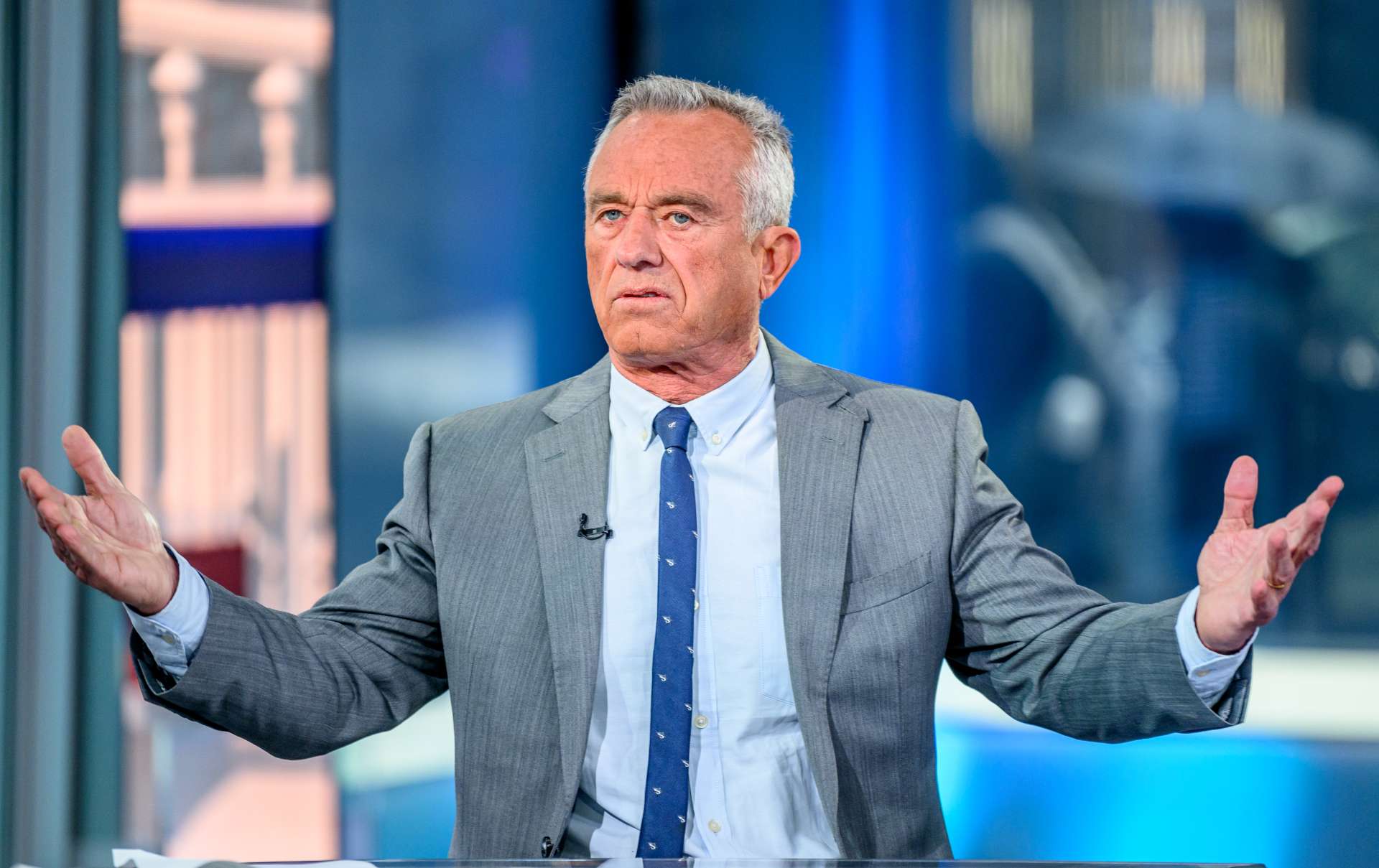How Robert F. Kennedy Jr.’s Brain Became the Diet of Worms
Can a presidential candidate afford to lose gray matter to parasites?

Until recently, the title of politician who generates the most mortifying headlines was indisputably held by South Dakota Kristi Noem, who in recent weeks has given us such marvels as “Trump VP contender Krist Noem writes of killing dog,” “Kristi Noem suggests Biden’s dog Commander should be killed too,” and “Kristi Noem has admitted the Kim Jong Un part of her book isn’t true but she read it for her audiobook anyway.”
You might think it’s impossible to top news stories about killing a dog and lying about meeting a dictator. But insurgent candidate Robert F. Kennedy Jr. inspired a headline on Wednesday that was even more disquieting: “R.F.K. Jr. Says Doctors Found a Dead Worm in His Brain.” Almost equally troubling was the subhead in The New York Times: “Presidential candidate has faced previously undisclosed health issues, including a parasite that he said ate part of his brain.”
Apparently, in 2010 Kennedy was experiencing symptoms of cognitive decline. His memory was becoming hazy and he was walking around in a state of confusion. Brain scans revealed a mysterious patch—possibly a tumor. At first, doctors feared that he, like his uncle Edward Kennedy, was suffering from brain cancer. But then a doctor at New York Presbyterian offered another diagnosis, that the blotch on the scans was, in Kennedy’s words, “caused by a worm that got into my brain and ate a portion of it and then died.”
Kennedy said these words as part of a deposition made in 2012 during divorce proceedings with his second wife, Mary Richardson Kennedy. In that deposition, Kennedy gave great salience to his poor health and diminished cognitive capacity, which he claimed resulted in a lower income—hence justification for a smaller alimony payment.
Aside from the dead parasite nestled inside his brain, Kennedy claimed that as a result of mercury poisoning (which he blamed on his love of eating fish), “I have cognitive problems, clearly. I have short-term memory loss, and I have longer-term memory loss that affects me.” The presidential hopeful ruefully acknowledged, “I loved tuna fish sandwiches. I ate them all the time.” To find someone else as in love with tuna as Kennedy, you have to turn to a movie: In the 2002 black comedy Matchstick Men, the addled and creepy Roy Waller (played by Nicholas Cage) is a tuna junkie on par with Kennedy.
Since college, Kennedy has also struggled with atrial fibrillation—an irregular heartbeat—which has led to repeated hospitalization. In a striking metaphor, he says of this condition, “It feels like there’s a bag of worms in my chest.”
Kennedy’s litany of health problems casts a shadow on his presidential aspirations for two distinct reasons. First, as the Times notes, Kennedy has made his personal fitness a key argument, contending that as a vigorous 70-year-old he is superior to his rivals Joe Biden (age 81) and Donald Trump (age 77), both of whom have arguably given signs of physical and cognitive decline. Kennedy’s campaign ads and videos show him skiing and lifting weights. He’s clearly meant to be someone in the same sporting league as his father (Robert F. Kennedy Sr.) and uncle John F. Kennedy, both of whom were famous for their fiercely competitive game of touch football. But of course the Kennedy legend always benefited from more than a bit of media trickery: Posthumously, it was revealed that John suffered from a longtime back injury that led to a heavy reliance on painkillers.
Is Robert Kennedy following in his uncle’s footsteps, presenting himself as an emblem of vigor while hiding a medical history that many voters might regard as disqualifying? Kennedy’s campaign claims he has fully recovered from his ailments and compares favorably to his political rivals. That may be the case, although even Biden and Trump do not have, as far as we know, missing brain parts.
In truth, while voters do seem to like robust politicians, cognitive decline should be a far bigger cause for concern than any other physical ailment. After all, the polio-stricken Franklin Roosevelt—wheelchair bound for most of his political career—was one of America’s greatest presidents. Jesse Jackson drew great applause at the 1984 Democratic National Convention when he thundered, “I would rather have Roosevelt in a wheelchair than Reagan on a horse.”
But beyond his physical impairments, Kennedy’s bizarre fish fetish raises questions about his judgment. After all, this is a man who has made his mark as an environmental lawyer, often litigating against corporations that have poisoned rivers with mercury. How could he not know about the dangers of gulping down tuna as a staple of your diet?
Kennedy’s ridiculous seafood diet parallels another example of his poor judgment, his support for the conspiracy theory that mercury in vaccines causes autism. This theory has no basis in science, and in any case, as Scientific American noted in 2017, Kennedy’s ill-informed crusade focuses on “thimerosal, a mercury-based preservative that had been removed from all childhood vaccines except for some variations of the flu vaccine in 2001.”
The Times story about Kennedy’s health thus has the effect of reminding voters of Kennedy’s great weakness as a candidate, his propensity for anti-scientific conspiracy theories (involving not just vaccines but also covid, pesticides, and pharmaceuticals). Politifact has listed some of Kennedy’s anti-scientific claims:
* Vaccines cause autism.
* No childhood vaccines “have ever been tested in a safety study pre-licensing.”
* There is “tremendous circumstantial evidence” that psychiatric drugs cause mass shootings, and the National Institutes of Health refuses to research the link out of deference to pharmaceutical companies.
* Ivermectin and hydroxychloroquine were discredited as COVID-19 treatments so COVID-19 vaccines could be granted emergency use authorization, a win for Big Pharma.
* Exposure to the pesticide atrazine contributes to gender dysphoria in children.
* COVID-19 is “targeted to attack Caucasians and black people. The people who are most immune are Ashkenazi Jews and Chinese.
If we step back from ideological debate, there is a more humane view we can take about Kennedy’s baroque medical history: It is proof of the human frailty that unites us all, whether we be commoners, kings, or Kennedys.
This was the view that William Shakespeare promoted in Hamlet (as the literary critic Ryan Ruby reminded me). In Act 4, Scene 3 of that great play, after having killed the pontificating Polonius, a closer adviser of Hamlet’s foe, King Claudius, the morose young Danish prince reflects on how we all end up as worm meat.
When Claudius asks him where Polonius has gone, the following exchange occurs:
Popular
“swipe left below to view more authors”Swipe →KING Now, Hamlet, where’s Polonius?
HAMLET At supper.
KING At supper? Where?
HAMLET Not where he eats, but where he is eaten. A certain convocation of politic worms are e’en at him. Your worm is your only emperor for diet. We fat all creatures else to fat us, and we fat ourselves for maggots. Your fat king and your lean beggar is but variable service—two dishes but to one table. That’s the end.
KING Alas, alas!
HAMLET A man may fish with the worm that hath eat of a king, and eat of the fish that hath fed of that worm.
Hamlet’s compassionate vision of the worm, the fish, and the politician all belonging to a common ecological cycle certainly describes Robert Kennedy, who has perhaps suffered, in both a metaphorical and literal way, from a convocation of politic worms in his brain.
But any magnanimous acknowledgement of Kennedy’s place in the larger cycle of life has to be balanced by candor about the real damage he’s done as a cranky conspiracy theorist and anti-science maven. Given his crackpot ideas, Kennedy brain might not have been part of that great cycle that Shakespeare sketched out. Rather, Kennedy’s brain broke that cycle. After all, the worm that died inside Kennedy’s cranium was surely malnourished to the point of starvation.
Disobey authoritarians, support The Nation
Over the past year you’ve read Nation writers like Elie Mystal, Kaveh Akbar, John Nichols, Joan Walsh, Bryce Covert, Dave Zirin, Jeet Heer, Michael T. Klare, Katha Pollitt, Amy Littlefield, Gregg Gonsalves, and Sasha Abramsky take on the Trump family’s corruption, set the record straight about Robert F. Kennedy Jr.’s catastrophic Make America Healthy Again movement, survey the fallout and human cost of the DOGE wrecking ball, anticipate the Supreme Court’s dangerous antidemocratic rulings, and amplify successful tactics of resistance on the streets and in Congress.
We publish these stories because when members of our communities are being abducted, household debt is climbing, and AI data centers are causing water and electricity shortages, we have a duty as journalists to do all we can to inform the public.
In 2026, our aim is to do more than ever before—but we need your support to make that happen.
Through December 31, a generous donor will match all donations up to $75,000. That means that your contribution will be doubled, dollar for dollar. If we hit the full match, we’ll be starting 2026 with $150,000 to invest in the stories that impact real people’s lives—the kinds of stories that billionaire-owned, corporate-backed outlets aren’t covering.
With your support, our team will publish major stories that the president and his allies won’t want you to read. We’ll cover the emerging military-tech industrial complex and matters of war, peace, and surveillance, as well as the affordability crisis, hunger, housing, healthcare, the environment, attacks on reproductive rights, and much more. At the same time, we’ll imagine alternatives to Trumpian rule and uplift efforts to create a better world, here and now.
While your gift has twice the impact, I’m asking you to support The Nation with a donation today. You’ll empower the journalists, editors, and fact-checkers best equipped to hold this authoritarian administration to account.
I hope you won’t miss this moment—donate to The Nation today.
Onward,
Katrina vanden Heuvel
Editor and publisher, The Nation
More from
Jeet Heer 

In America, Mass Shooting Survivors Can Never Know Peace In America, Mass Shooting Survivors Can Never Know Peace
A growing number of US residents have lived through more than one massacre.

Corporate Democrats Are Foolishly Surrendering the AI Fight Corporate Democrats Are Foolishly Surrendering the AI Fight
Voters want the party to get tough on the industry. But Democratic leaders are following the money instead.

Sleepy Donald Snoozes, America Loses Sleepy Donald Snoozes, America Loses
It’s bedtime for Bozo—and you're paying the price.

The Revolt of the Republican Women The Revolt of the Republican Women
Speaker Mike Johnson’s sexism is fueling an unexpected uprising within the GOP caucus.

Donald Trump’s Imperialism Is Murdering People—at Home and Abroad Donald Trump’s Imperialism Is Murdering People—at Home and Abroad
Trump’s boat bombings deserve legal retribution, but also show why we need an entirely new foreign policy.

Zohran Mamdani’s Pragmatic Socialism Is Paying Off—for Now Zohran Mamdani’s Pragmatic Socialism Is Paying Off—for Now
The incoming mayor has improbably charmed Donald Trump and given himself some political breathing room. But nobody should get too comfortable.


